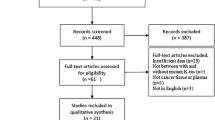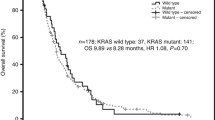Summary
Conclusion
This study could not attribute survival differences to the coincident acquisition of two common genetic alterations, K-ras mutation and p53 overexpression in pancreatic adenocarcinoma patients. Additionally, our data indicate the converse to be true: Those patients lacking both K-ras mutation and aberrant p53 expression showed the shortest survival when compared with cases showing either alteration or both. This study also showed the negative effect of K-ras mutation and p53 expression on pancreas cancer patient's survival after treatment with either radiation therapy or chemotherapy.
Background
Mutations of the oncogene K-ras at codon 12 are reported to be the most common genetic alteration in pancreatic carcinoma, whereas either overexpression or mutation of the tumor suppressor p53 gene is considered the most common genetic alteration in neoplasia of all types. p53 overexpression has been attributed to survival differences in pancreatic carcinoma, but such association is still controversial. No studies have fully documented the combined incidence of K-ras and p53 alterations in pancreatic adenocarcinoma, or their combined effect on patient survival in a large case series. The influence of radiation or chemotherapy in groups showing both, either, or neither mutation is also undocumented.
Methods
Paraffin-embedded tissue sections from 76 cases of pancreatic adenocarcinoma were cut for DNA extraction for K-ras analysis and immunohistochemical staining for aberrant p53 expression. K-ras mutation was determined by single-strand conformation polymorphism (SSCP) and slot-blot allele-specific oligonucleotide (ASO) hybridization of PCR-amplified DNA product. p53 expression was scored on the basis of percent nuclear staining with the MAb DO7.
Results
Sixty-four of 76 cases (84%) showed K-ras mutation, p53 expression, or both. K-ras was mutated in 55 of 76 cases (72%). p53 was expressed in 33 of 76 cases (43%). Twenty-four of 76 cases (31%) showed both K-ras mutation and p53 expression. The presence of both alterations was not related to significant differences in tumor grade, stage, or survival compared to either alteration alone. A sizable subset (16% of cases) lacked either alteration, and surprisingly, this group showed the shortest median survival compared to those with K-ras mutation, p53 expression, or both (p=0.024). Patients whose tumors were K-ras-negative showed the greatest difference in median survival with radiation therapy (median survival 30.8 mo vs 7.8 mo with no radiation,p=0.005).
Similar content being viewed by others
References
Fialkow PJ. The origin and development of human tumors studied with cell markers.N Engl J Med 1974; 291: 26–35.
Caldas C, Kern SE. K-ras mutation and pancreatic adenocarcinoma.Int J Pancreatol 1995; 18: 1–6.
Kalthoff H, Schmiegel W, Roeder C, Kasche D, Schmidt A, Lauer G, Thiele H-G, Honold G, Pantel K, Riethmueller G, Scherer E, Maurer J, Maacke H, Deppert W. p53 and K-ras alterations in pancreatic epithelial cell lesions.Oncogene 1993; 8: 289–298.
Es JM, Polak MM, van den Berg FM, Ramsoekh TB, Craanen ME, Hruban RH, Offerhaus GJA. Molecular markers for diagnostic cytology of neoplasm in the head region of the pancreas: mutation of K-ras and over-expression of the p53 protein product.J Clin Pathol 1995; 48: 218–222.
Pellegata NS, Sessa F, Renault B, Bonato M, Leone BE, Solcia E, Ranzani GN. K-ras and p53 gene mutations in pancreatic cancer: ductal and nonductal tumors progress through different genetic lesions.Cancer Res 1994; 54: 1556–1560.
Berrozpe G, Schaeffer J, Peinado MA, Real FX, Perucho M. Comparative analysis of mutations in the p53 and K-ras genes in pancreatic cancer.Int J Cancer 1994; 58: 185–191.
Parker SL, Tong T, Bolden S, Wingo P. Cancer statistics 1996.CA Cancer J Clin 1996; 65: 5–27.
Hollstein M, Sidransky D, Vogelstein B, Harfis CC. p-53 mutations in human cancers.Science 1991; 253: 49–53.
Hermreck AS, Thomas CY IV, Friesen SR. Importance of pathologic staging in the surgical management of adenocarcinoma of the pancreas.Am J Surg 1974; 127: 653–657.
Sarkar FH, Valdivieso M, Borders J, Yao K-L, Raval M, Madan S, Sreepathi P, Shimoyama R, Steiger Z, Visscher D, and Crissman J. A universal method for the mutational analysis of K-ras and p53 gene in non-small-cell lung cancer using formalin-fixed paraffin-embedded tissue.Diag Mol Pathol 1995; 4: 266–273.
Bos JL. The ras gene family and human carcinigenesis.Mutat Res 1988; 195: 255–271.
Caldas C, Kern SE. K-ras mutation and pancreatic adenocarcinoma.Int J Pancreatol 1995; 18: 1–6.
Grimmond SM, Raghanam D, Russell PJ. Detection of a rare point mutation in Ki-ras of a human bladder cancer xenograft by polymerase chain reaction and direct sequencing.Urology Res 1992; 20: 121–126.
Jacoby RF, Llor X, Teng BB, Davidson NO, Brasitus TA. Mutations in the K-ras oncogene induced by 1,2-dimethylhydazine in preneoplastic and neoplastic rat colonic mucosa.J Clin Invest 1991; 87: 624–630.
Visscher DW, Sarkar FH, Shimoyama RK, et al. Correlation between p53 immunostaining patterns and gene sequence mutations in breast carcinoma.Diag Mol Pathol 1996; 5: 187–193.
Nakamori S, Yashima K, Murakami Y, Ishikawa O, Ohigashi H, Imaoka S, Yaegashi S, Konishi Y, Sekiya T. Association of p53 gene mutations with short survival in pancreatic adenocarcinoma.J Cancer Res 1995; 86: 174–181.
Yokoyama M, Yamanaka Y, Freiss H, Buchler M, Korc M. p53 expression in human pancreatic cancer correlates with enhanced biological aggressiveness.Anticancer Res 1994; 14: 2477–2484.
Boschman C, Reddy JK, Rao MS. Immunohistochemical analysis of p53 protein expression in human pancreatic ductal adenocarcinomas and precursor lesions.Lab Invest 1994; 70: 129A.
Hameed M, Marrero AM, Conlon KC, Brennen MF, Klimstra D. Expression of p53 nucleophosphoprotein inin situ pancreatic ductal adenocarcinoma: an immunohistochemical analysis of 100 cases.Lab Invest 1994; 70: 132A.
Zhang SY, Ruggeri B, Agarwal P, Sorling AF, Obara T, Ura H, Namiki M, Klein-Szanto JP. Immunohistochemical analysis of p53 expression in human pancreatic carcinomas.Arch Pathol Lab Med 1994; 118: 150–154.
Yanagisawa A, Ohtake K, Ohashi K, Hori M, Kitagawa T, Sugano H, Kato Y. Frequent cKi-ras oncogene activation in mucous cell hyperplasias of pancreas suffering from chronic inflamation.Cancer Res 1993; 53: 953–956.
Lemoine NR, Jain S, Hughes CM, Staddon SL, Maillet B, Hall PA, Kloppel G. Ki-ras oncogene activation in preinvasive pancreatic cancer.Gastroenterology 1992; 102: 230–236.
vanKranen HJ, Vermoulen E, Schoren L, Bax J, Woutersen RA, vanLersel P, van Kreiji CF, Scherer E. Activation of c-K-ras is frequent in pancreatic carcinomas of Syrian hamsters, but is absent in pancreatic tumors of rats.Carcinogenesis 1991; 12: 1477–1482.
Cermu WL, Mangold KA, Scarpelli DG. K-ras mutation is an early event in pancreatic duct carcinogenesis in the Syrian golden hamster.Cancer Res 1992; 52: 4507–4513.
Motojima K, Urano T, Nagata Y, Shiku H, Tsunoda T, Kanematsu T. Mutations in the Kirsten-ras oncogene are common but lack correlation with prognosis and tumor stage in human pancreatic carcinoma.Am J Gastroenterol 1991; 86: 1784–1788.
Chen YQ, Gao X, Grignon DJ, Sarkar FH, Sakr WA, Cipfiano SC, Honn KV, Borders J, Crissman JD. Multiple mechanisms of p53 inactivation in prostatic carcinoma.Cancer Mol Biol 1994; 1: 357–367.
Redston MS, Caldas C, Seymour AB, Hruban RH, de Costa L, Yeo CJ, Kern SE. p53 mutations in pancreatic carcinoma and evidence of common involvement of homocopolymer tracts in DNA microdeletions.Cancer Res 1994; 54: 3025–3033.
Greenblatt MS, Bennett WP, Hollstein M, Harris CC. Mutation in the p53 tumor suppressor gene: clues to cancer etiology and molecular pathogenesis.Cancer Res 1994; 54: 4855–4878.
Vans ES MJ, Polak MM, van den Berg FM, Ramsoekh TB, Craanen ME, Hruban RH, Offerhaus GJA. Molecular markers for diagnostic cytology of neoplasms in the head region of the pancreas: mutation of K-ras and overexpression of the p53 protein product.J Clin Pathol 1995; 48: 218–222.
Kasid U, Suy S, Dent P, Ray S, Whiteside TL, Sturgill TW. Activation of Raf by ionizing radiation.Nature 1996; 382: 813–816.
Author information
Authors and Affiliations
Rights and permissions
About this article
Cite this article
Dergham, S.T., Dugan, M.C., Kucway, R. et al. Prevalence and clinical significance of combined K-ras mutation and p53 aberration in pancreatic adenocarcinoma. Int J Pancreatol 21, 127–143 (1997). https://doi.org/10.1007/BF02822384
Received:
Revised:
Accepted:
Issue Date:
DOI: https://doi.org/10.1007/BF02822384




